
Denotation und Konnotation einfach erklärt sofatutor YouTube
The terms, denotation and connotation, are used to convey and distinguish between two different kinds of meanings or extensions of a word. A denotation is the strict, literal, definition of a word, devoid of any emotion, attitude, or color. The connotation of a word or term adds elements of emotion, attitude, or color. The meaning or use of denotation and connotation depends partly on the.
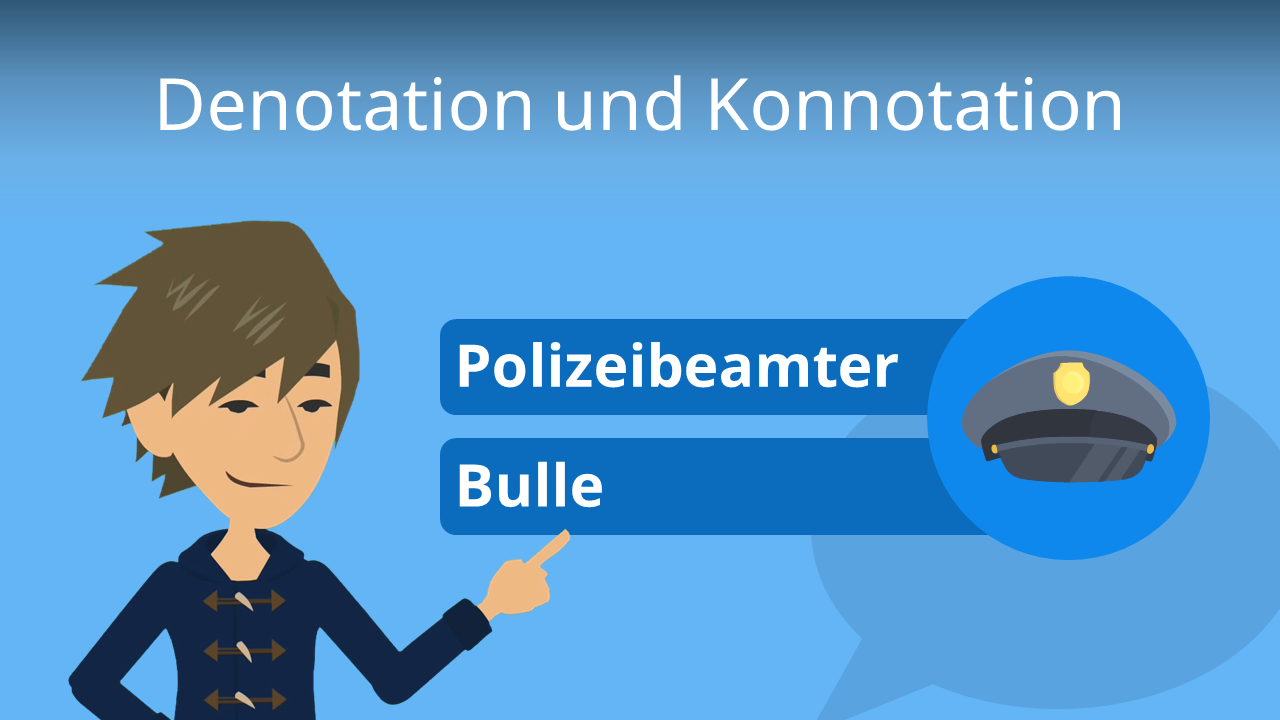
Denotation und Konnotation • Bedeutung & Beispiele · [mit Video]
The denotation of a word or phrase is its literal or obvious meaning or reference as specified in a dictionary; the connotations of a word or phrase are the secondary or associated significances that it commonly suggests or implies. This distinction is complicated in practice because many words have more than one denotation and because.

Коннотативный аспект значения слова Коннотация vs денотация Сферы
In poetry and other sorts of creative writing, the relationship between the denotation of a word - what the dictionary sets out to analyse and define - and the connotations of that same word, may be much less stable than in other types of text. But the OED's method of printing short quotations as evidence of a word's meaning and usage.

Denotation und Konnotation Deutsch Grammatik YouTube
Denotation und Konnotation leicht erklärt. zur Stelle im Video springen. (00:21) Die Denotation eines Wortes meint die ursprüngliche Grundbedeutung des Begriffs. Das ist also die neutrale, wertfreie Wortbedeutung. Sie gibt an, welche Gegenstände, Handlungen oder Eigenschaften mit diesem Begriff bezeichnet werden.
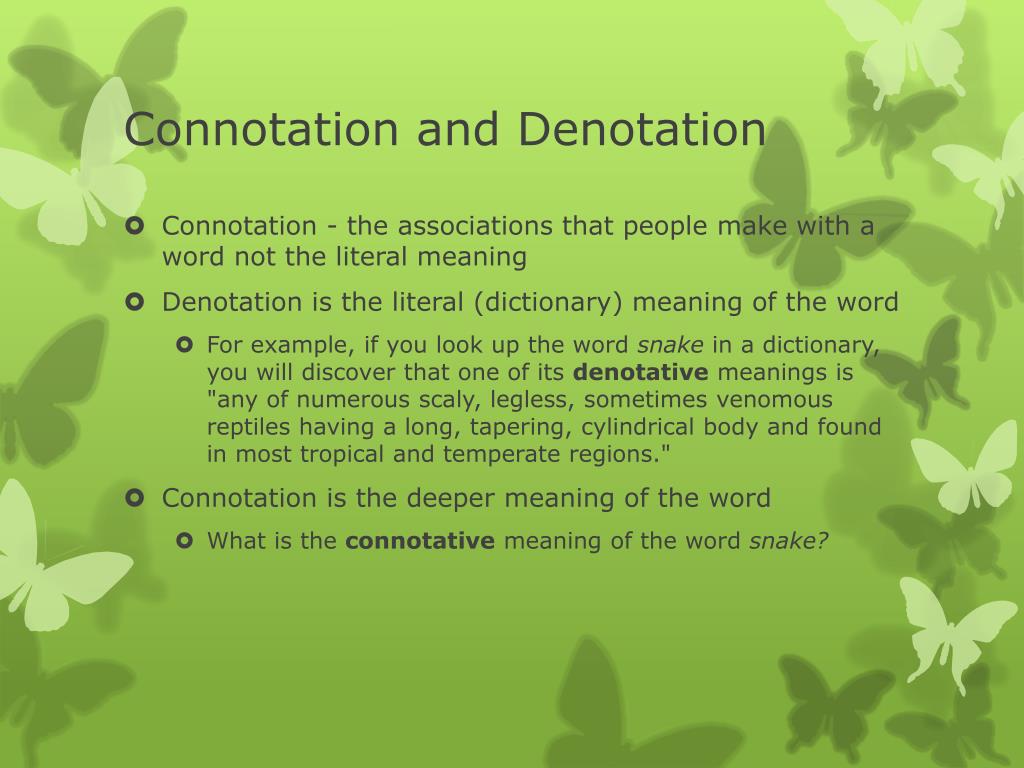
PPT Imagery, Denotation, Connotation PowerPoint Presentation, free download ID2324252
What's the difference between connotation and denotation? In short, denotation is the standard definition of a word, whereas connotation is the feeling evoked by a word. Read on to learn more!

"Connotation" vs. "Denotation" in English LanGeek
Connotation and Denotation are crucial concepts in Semiotics, Structuralism, Marxism, Cultural Studies and in the entire realm of literary and cultural theory. Denotation refers to the primary signification or reference - the definitional, literal, obvious meaning of a sign. In the case of linguistic signs, the denotative meaning is what the dictionary attempts to provide,…
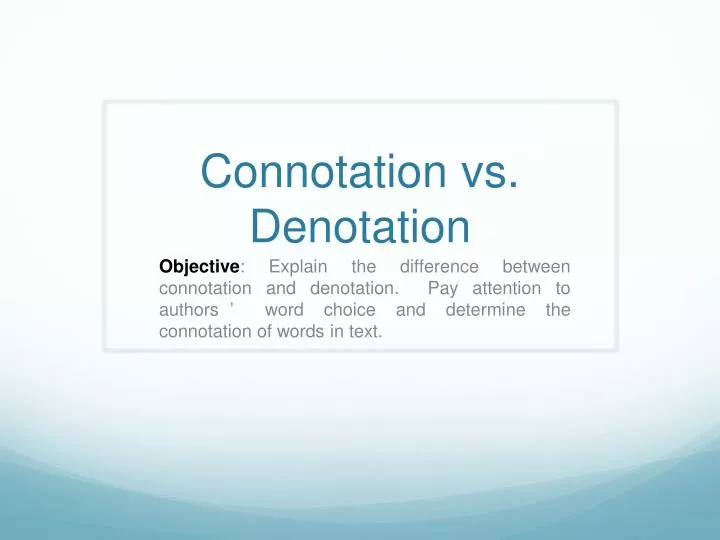
PPT Connotation vs. Denotation PowerPoint Presentation, free download ID4355041
A connotation is the feeling a word invokes. But take note! A denotation is what the word literally says. If these words were on a trip, connotation would be the baggage, and denotation would be the traveler. A connotation is the baggage a word or idea drags around. The word "baggage" often has a negative connotation.
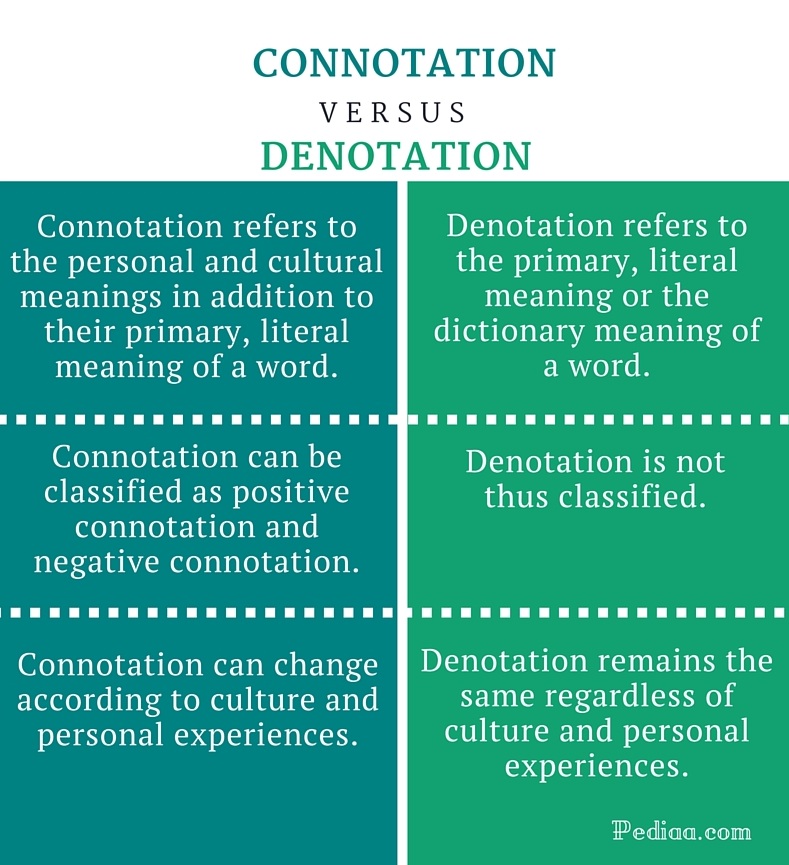
Difference Between Connotation and Denotation
Here a couple examples: 1a) Denotation of cross: two intersecting lines, usually perpendicular. 1b) Connotation of cross: symbol for the crucifixion of Christ; x-mark in lettering; etc. 2a) Denotation of apple: an edible fruit grown from an apple tree. 2b) Connotation of apple: technology company; forbidden fruit; good student; etc.

Connotative and Denotative Meaning Examples
A skilled artist. (dated) A man or a boy; mister. See Master. A master's degree; a type of postgraduate degree, usually undertaken after a bachelor degree. A person holding such a degree. The original of a document or of a recording. The primary wide shot of a scene, into which the closeups will be edited later.
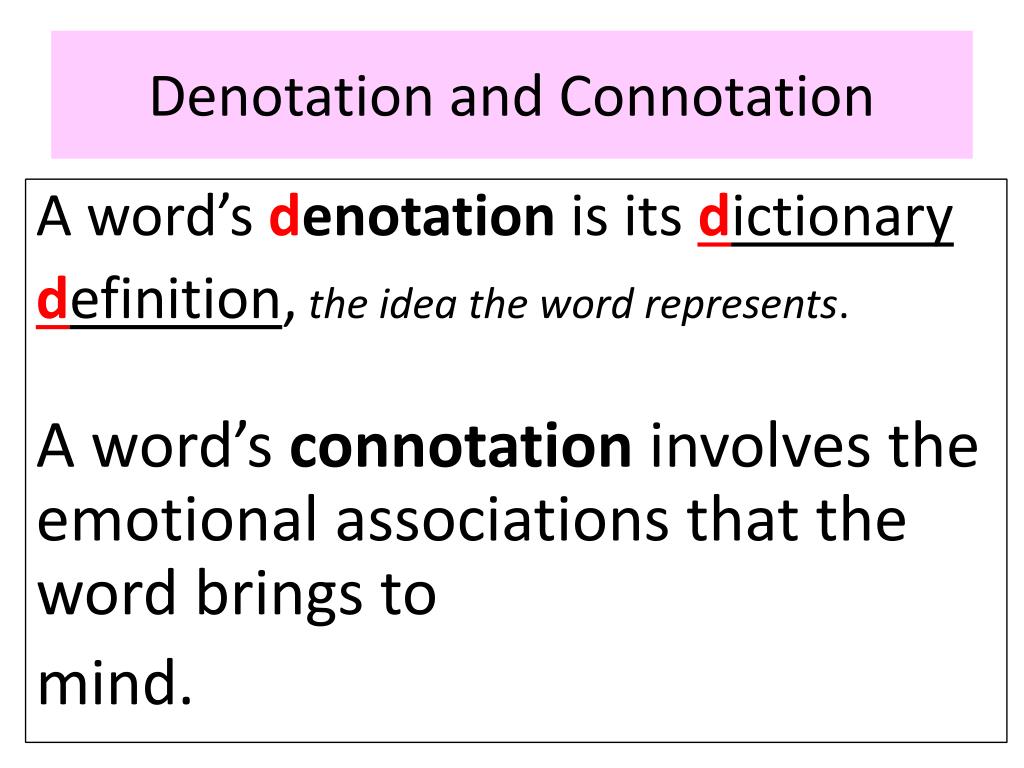
PPT Denotation and Connotation PowerPoint Presentation, free download ID2861432
Eine Konnotation kann von jeder Person anders empfunden werden. Die Denotation von Nacht ist z.B. die Zeitspanne von Mitternacht bis zum Aufstehen, wobei die Konnotation zum einen „Angst vor Dunkelheit" und zum anderen „ein wohliges Gefühl, da man die Sterne und den Mond sehen kann" sein kann.

PPT Connotation vs. Denotation PowerPoint Presentation, free download ID974540
While denotation is the ideal definition of a term according to the dictionary, the connotation is the implied or indirect meaning of the term. Connotation implies the broad range of positive and negative associations that the words convey, whereas denotation is the accurate explanation of the word, which can be found in the dictionary.
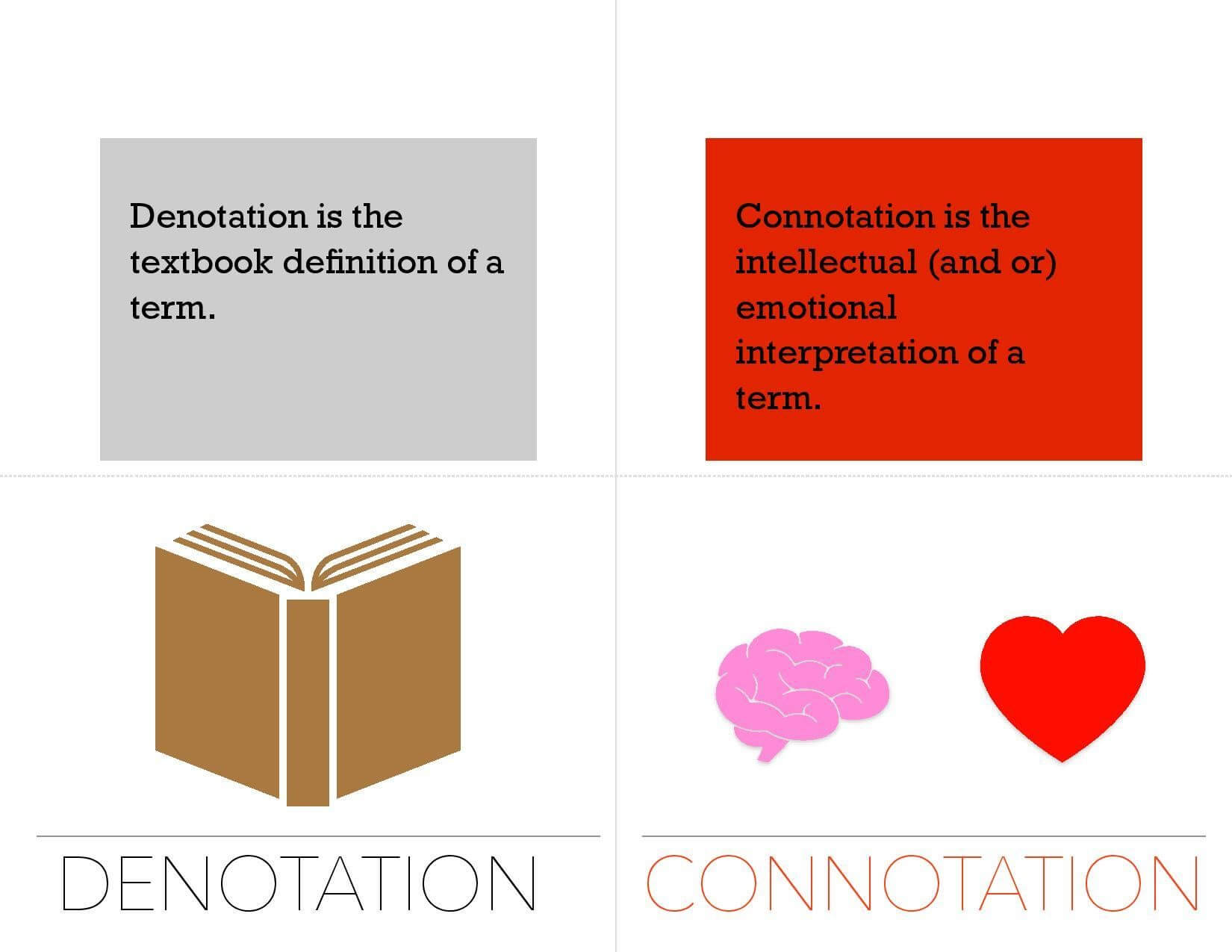
What is Connotation? Definition & Examples in Literature & Film
Denotation is the dictionary definition of a word, while connotation is the feelings associated with a word. While the denotation of a word is pretty cut and dry, one word can have many connotations for different people, and those connotations could be neutral, positive, or negative. One easy way to keep these two concepts straight is that.

PPT Connotation and denotation PowerPoint Presentation, free download ID2232586
Both denotation and connotation stem from the Latin word notāre, meaning "to note.". One way to remember the difference between the terms is to take a hint from how they begin. The con- in connotation comes from a Latin term meaning "together" or "with," reminding us that the connotation of a word works with or alongside its.
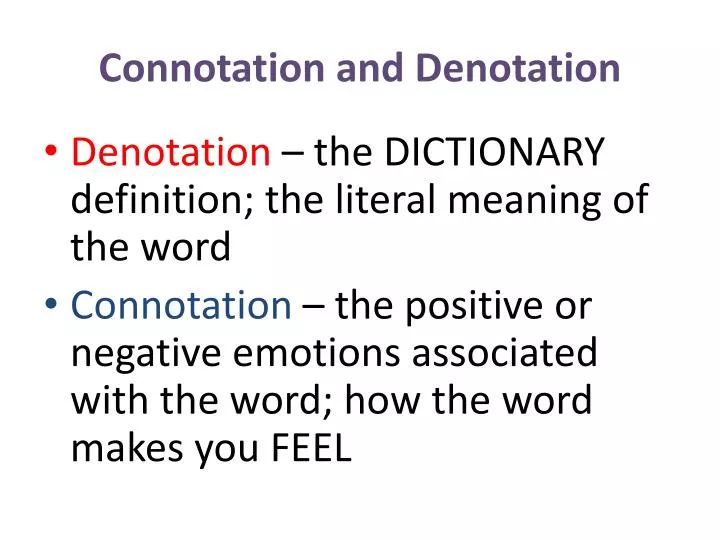
PPT Connotation and Denotation PowerPoint Presentation, free download ID2861421
A word's denotation is its plain and direct meaning or meanings. It's what the word explicitly means—that is, what is fully and clearly expressed by a word. A word's connotation is what the word implies or suggests; that is, the nuances and shades of meaning that the word brings along with it, apart from what it explicitly names or.
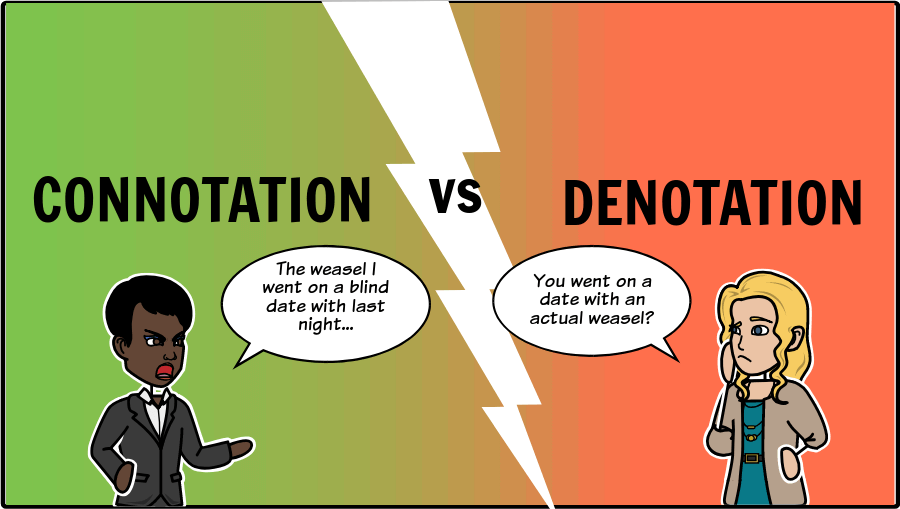
Connotation vs Denotation Ideas Connotation and Denotation
Connotation refers to the emotional or cultural resonance of a word. For instance, while the word "home" might denote "a place where one lives," its connotation might include feelings of warmth, security, and love. On the flip side, consider a word like "snake.". Its denotation is simply "a long, legless reptile.".
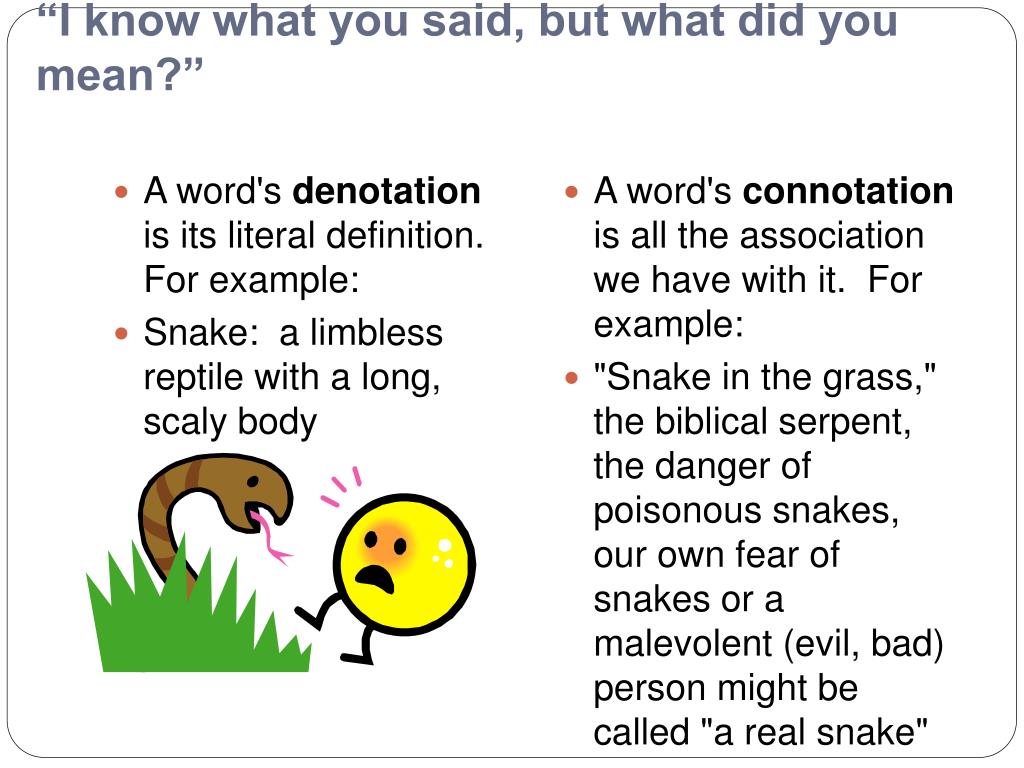
PPT Connotation vs. Denotation PowerPoint Presentation, free download ID974540
Meanings. In grammar, a word's denotation is whatever the word directly refers to, roughly equivalent to its lexical definition. Thus, the word "atheist" denotes a person who disbelieves in or denies the existence of gods. A word's connotation refers to any subtle nuances that might or might not be intended by its use.